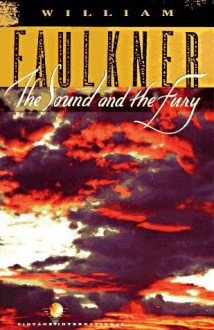
One of the greatest novels of the 20th-century follows the disintegration of former Southern aristocrats looked at in four different ways. The Sound and the Fury is considered William Faulkner’s greatest novel, following members of the Compson family over roughly 30 years in which the once great aristocratic Southern family breaks down from within and influence socially.
The book begins with man-child Benjamin “Benjy” Compson remembering various incidents over the previous 30 years from his first memory of his sister Caddy climbing a tree, his name being changed after his family learned he was mentally handicapped, the marriage and divorce of Caddy, and his castration all while going around his family’s property in April 1928. The second section was of Quentin Compson, skipping classes during a day of his freshman year at Harvard in 1910 and wandering Cambridge, Massachusetts thinking about death and his family’s estrangement from his sister Caddy before committing suicide. The third section followed a day in the life of Jason Compson who must take care of his hypochondriac mother and Benjy along with his niece, Caddy’s daughter Quentin. Working at a hardware store to make ends meet while stealing the money his sister sends to Quentin, Jason has to deal with people who used to lookup to his family and with black people who irritate the very racist head of the Compson family. The four section follows several people on Easter Sunday 1928 as the black servants take care of Benjy and gets for the Compsons while Jason finds out that Quentin as runaway with all the money in the house, which includes the money he stole from her and his life savings. After failing to find Quentin, Jason returns to town to calm down Benjy who is having a fit due to his routine being changed.
In constructing this book, Faulkner employed four different narrative styles for each section. Benjy’s section was highly disjointed narrative with numerous time leaps as he goes about his day. Quentin’s section was of an unreliable stream of consciousness narrator with a deteriorating state of mind, which after Benjy’s section makes the reader want to give up the book. Jason’s section is a straightforward first-person narrative style with the fourth and final section being a third person omniscient point-of-view. While one appreciates Faulkner’s amazing work in producing this novel, the first two sections are so all over the place that one wonders why this book was even written and only during the last two sections do readers understand about how the Compson family’s fortunes have fallen collectively and individually.
The Sound and the Fury is overall a nice novel, however the first two sections of William Faulkner’s great literally derails interest and only those that stick with the book learn in the later half what is going on with any clarity. I would suggest reading another Faulkner work before this if you are a first-time reader of his work like I was because unless you’re dedicated you might just quit.

 Log in with Facebook
Log in with Facebook 







